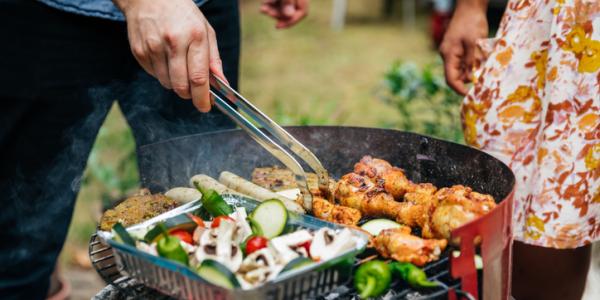
From casual family meals to neighborhood gatherings, grilling outdoors is a quintessential part of summer.
Grilling is a great way to maximize flavor without adding a lot of calories, and it makes clean-up a breeze. But a hot grill and open flame are potential hazards, so follow these tips to keep your next barbeque safe and healthy:
Handle raw meat with care to prevent cross-contamination. Uncooked meat can contain harmful bacteria, which can be transferred to other foods through unwashed hands, utensils, or cutting boards. Wash your hands and utensils thoroughly with soap and hot water after handling raw meat, and keep raw meat separate from other foods in your grocery cart, refrigerator and countertop to reduce the risk of the meat or its juices coming into contact with other foods.
Try healthy and flavorful marinades. Fish in particular benefits from a simple marinade. Try marinating any type of fish for 30 minutes in rosemary and lemon juice. The fish will be moist and delicious and the rosemary and lemon juice have both been shown to reduce the amount of potentially harmful HCAs (heterocyclic amines) that develop when you grill any meat, fish, poultry or pork at high temperatures over an open flame.
Cook meat thoroughly. Appearances can be deceiving, so invest in a meat thermometer to make sure your food is thoroughly cooked. Raw beef, pork, lamb and veal steaks, chops and roasts should be cooked to a minimum internal temperature of 145 degrees Fahrenheit, ground meats must reach 160 degrees and poultry isn’t safe until it registers 165 degrees. Once you have finished grilling, keep the food hot until it is ready to be served by moving it off to the side of the grill rack, or putting it in an oven set to about 200 degrees.
Keep your grilling area safe. Keep hot grills away from high-traffic areas, and place them on a flat ground to minimize the risk of tripping. No matter how bad the weather is, never bring a charcoal grill into the house or an open doorway. Burning charcoal produces deadly carbon monoxide that you might not be able to detect. And never leave a lit grill unattended.
Keep the grill master safe. Use only long-handled utensils to avoid burns and splatters. Don't wear loose fitting clothes or long shirttails or apron strings that can catch fire. Keep baking soda on hand to control grease fires, and a fire extinguisher nearby to douse any bigger flames.
This article first appeared in the August 2014 edition of the HealthPerks newsletter.

